Control Anything From Anywhere Buy Now
VegeHub WiFi Control Hub
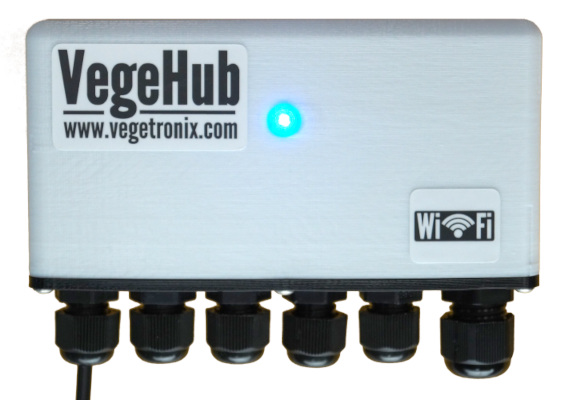
Talks to Local Network Sensors

Posts Data to Cloud Sites

Externally Visible Status LED

Rugged Weather Proof Case

Secure Transfers with SSL/TLS

Waterproof Cable Glands

16A 250V Latching Relay

Up To 4 Sensor Inputs

Long Battery Life

Stop Over watering: Moisture Sensor Controlled Hose Sprinkler
VegeHub WiFi Control Hub - Features
VegeHub WiFi Control Hub - Applications
- Control and monitoring of sprinkler systems.
- Control and monitoring of heaters.
- Control and monitoring of water tanks.
- Control and monitoring of lighting systems.
- Control and monitoring of trow lights.
- Garden and farm automation.
- Alarm systems.
- Crop Steering.
What will you Control with the WiFI Control Hub?
The applications for the VegeHub WiFi control hub are limitless.
Control anything from anywhere with input from local or remote sensors. It can control water pumps, sprinkler systems, alarms, lights, heaters, fans and valves.
The VegeHub WiFi control hub has all of the functionality of our standard 4 input sensor WiFI hub with the addition of a high capacity 16A 250V relay, which can turn on or off nearly any electrical device.
The relay can be controlled by settings from the local sensor inputs, or from an external web link, which you specify.
View your sensor data from any web browser on your phone or computer. Get text messages and emails from sensor triggers.
Within minutes you will be able to setup the VegHub and send data to common 3rd party data aggregation web sites such as: VegeCloud.com.
Get creative with how you use the WiFi control hub. For example, you can monitor and control chicken water tanks with AquaPlumb Sensors, and get an alert when the water is getting low. You can remotely control the soil moisture and temperature of your garden or greenhouse using VH400 soil moisture sensors, and THERM200 soil temperature sensors.
You'll probably come up with applications we haven't even though about. Drop us a email if you do, and we'll post them on our site.
Built-in Security For Your Sensors
The VegeHub uses TLS 1.2 SSL for secure Internet connections, allowing it to do secure HTTPS posts to servers. If you don't care about security, you can still post using regular HTTP.
The VegeHub comes with the most commonly used website certificates, or you can easily install your own.
Distributed Control on Your Local Network
What's amazing is that VegeHubs can talk to each other on your local network.
Hubs are both clients and web servers. Any awake hub that is powered with wall or solar power can be queried through it's API. So you can create a distributed control network for your garden, lawn or green house.
Hubs can query other hubs on the network to get sensor data, and make decisions to turn on actuators such as pumps, fans, valves or lights. There is no need to go through a central server, with the hubs all working together as independent units.
When configuring a VegeHub, you can scan your local network for other VegeHubs and get a roster of all sensors and actuators of the hubs on your network.
Connect to Common 3rd Party Sites
Your VegeHub will connect with data aggregation websites such as VegeCloud, ThingSpeak, or io.Adafruit out of the box. These sites will graph your data, and allow you to create actions, such as send an email, when your sensor data has crossed a particular threshold.
We especially recommend: VegeCloud.com which will store your data, and allow you visualize it with graphs, and allow you to set triggers on your data so that you can get text alerts and email messages, when your sensors have passed a threshold value.
Vegecloud.com also allows you to remotely change your hubs settings. When your VegeHub posts data to VegeCloud it checks to see if any of it's settings have changed, and updates accordingly.
If you want to post to your own website, this is also possible, using our simple VegeHub API.
Designed for Long Battery Life
One of our primary design goals for the VegeHub was long battery life. We wanted you to be able to place this anywhere without worrying about power connections. Under normal use scenarios batteries will last over a year.
We designed the hub with a power efficient latching relay. Power is only consumed for 40 milliseconds when the latching relay changes state. The rest of the time it consumes zero power, even when the relay is engaged.
The hubs come with a battery cable clip, suitable for standard 9V batteries. If you are using power from an adapter, you can replace the clip with your own wires.
For extended durations we recommend using a 9V AA battery pack with 6 AA batteries. We sell 9V AA battery holders. Use lithium batteries if the location will get cold.
You can configure the VegHub to send it's battery voltage when it updates to the server, so that you can monitor its level.
Battery life depends on your sample frequency, and update rate. Most agricultural sensors change rather slowly, and so a sample rate of once per hour is often sufficient and will extend your battery life.
Make sure you don't put batteries inside the box, because it is air tight, the batteries will off gas acid in the heat corroding the components.
Fast and Easy Setup
You can configure the VegeHub and add it to your local WiFi network by using a browser on your phone or PC.
Once you have connected it to your network you can plug in a USB thumb drive, and it will write its IP address to a file. This IP address allows you to configure it through it's web interface.
To configure it, press a button, and it will become a mini web server on your network, and serve up configuration pages. Examples of the configuration pages are provided below.
These pages allow you to select the cloud site to which you want the hub to report data. Each channel can be independently configured with multiple options. For example channels can be configured to sample data periodically or, can be trigger on an event. The sensor warm up time is configurable, as well as how often the hub reports to the server. If your sensor is just a push button switch you can configure the channel to have pull up or pull down resistors. See the Quick Start Guide for step by step instructions.
Rugged and Waterproof for Long Life in Harsh Conditions
You can put this box outside in the rain or snow. The rugged PET plastic box has silicone rubber gaskets making it waterproof. All of the cable entry points use cable glands, so that no water or insects can get in.
The box has screw holes for easy mounting, so that you can put it anywhere.
Internally Stores Data When Internet is Down
If your Internet goes down - no problem. The Vegehub has an internal 64 sample storage for each sensor channel. The buffer is circular, so if the Internet goes down for tool long, such that the storage fills up before you can post the data to the server, the older samples will be overwritten.
If an optional micro SD card is inserted it will append sample data to a file in CSV format.
Control the Relay with Internal or Remote Sensors on the Web
The relay can be activated by the conditions of local sensors connected to the hub, or can be activated by a value returned from a remote server.
In the case of using local sensors, you can flip the relay based on a sensor being greater than a value, less than a value, inside a range, or outside a range. For example, with a THERM200 soil temperature sensor on an input channel, you could turn on a fan with the relay, if the temperature gets too hot. Or, with a VH400 soil moisture sensor you could turn off the relay, when it rains, and the ground is wet.
The relay also has an advanced hysteresis setting, which reduces relay chatter from noisy sensors. Hysteresis increases longevity of pumps, valves or what ever you are controlling, because it prevents jitter. Most thermostats use this. Without it, your heater would turn on and off rapidly; as the temperature barely reached the target point it would turn off the heater, and then turn right back on seconds later as the room cooled. The hysteresis is single sided. For a better understanding of how hysteresis works in our system see this link: Single Sided Hysteresis.
What makes the relay hub so powerful, is that you can also activate the relay from any remote sensor on the web or your local network. In fact, it doesn't even need to be a sensor, you could for example trigger the relay on abstract data such as a stock quote. When the hub reports data back to the server, it also will retrieve data from a URL that you specify. The data needs to be in JSON format, and can be a numerical or boolean value. You specify a conditional of greater than, less than, inside a range or outside a range, and if the condition is met, the relay will activate.
When configuring the relay hub, you enter in a URL and path to the JSON field which will trigger the relay. To help you figure out the path, we've created an on-line tool called PathGen which will parse a JSON response from any URL, and tell you the path for each value of the JSON.
You can also create lockout times using flexible time conditionals, such as allowing the sensor to only turn on at night time, if the sensor conditionals are met.
See the screen shots of the configuration pages to see how easy it is to setup relay conditions. Or, you can ignore sensor inputs, and trigger the relay on timed events. Merely create a sensor condition, that is always true, and the time condition that you specify will dictate the state of the relay.
Over The Air Firmware Updates
We are constantly improving and adding features to the the VegeHub's software. As such, we've made it very easy to check for new software updates, and to update the firmware using your Hub's WiFi connection.
You can easily check the VegeHub's current firmware version, by pressing a button on its settings page. It will contact the server, and let you know if it has the latest firmware. If it's not up to date, press the update button, and it will retrieve the latest version from our server, and reprogram itself, with the process taking only a couple of minutes.
Vegetronix Modular Building Blocks
Our product philosophy is simple. We provide low-cost modular building blocks to our customers, and then let them come up with their own applications.
Get creative with our very unique sensors, WiFi Hubs, Relay Boards and come up with your own creations.
We Want you to be Happy
Ordering is easy and low risk. Since we build our own products at our factory, all of our products are in stock. When you place your order from our website, it will ship same day from our factory, and you'll have it in your hands in just a couple of days. We ship to nearly EVERY COUNTRY in the world.
If you aren't amazed and delighted by your new VegeHub, return it for a refund within 30 days.
What Our Customers Are Saying:
"So far I'm very impressed by Vegetronix products. I work in IoT professionally but don't have the time to put together my own microcontroller-based solution. You've solved all the critical IoT issues (TLS, low-energy, find out local IP address, send to cloud, etc) not to mention your magic soil moisture sensor. Everything I've tried so far (VegeHub and Air temp sensor) is simple and easy to use and worked on the first try. Well done."
Thomas in Redmond, WA
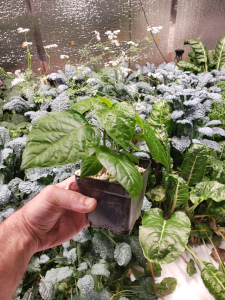
"The two Vegehub units I am using at my personal vegetable growing areas have not skipped a beat in two years. My highest respect to you for supplying a bulletproof product that is reliable and reasonably priced. As a bonus, I began tracking water usage via input volumes with Vegehub versus a digital timer schedule and I am saving 60% in nutrients and water."
Zach in Buckfield, ME

Automatically synchronize grow lights with the sun.
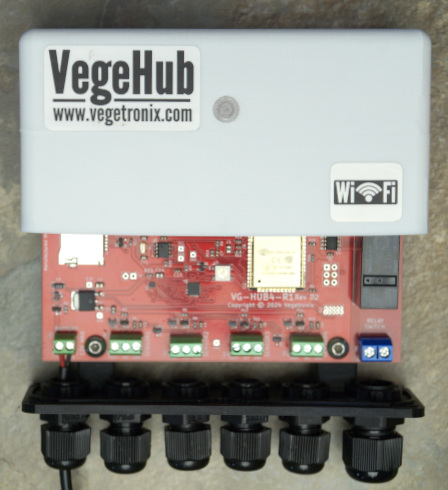
Easy connect sensors to terminal blocks inside the VegeHub.
VegeHub Screen Shots of Web Interface
The following screen shots of the VegeHub's web interface show how the VegeHub can be flexibly configured.
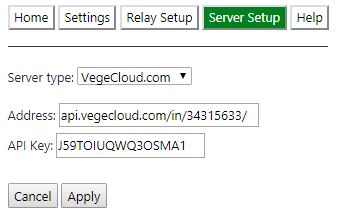
Select Your Cloud Server Through its Setup Pages
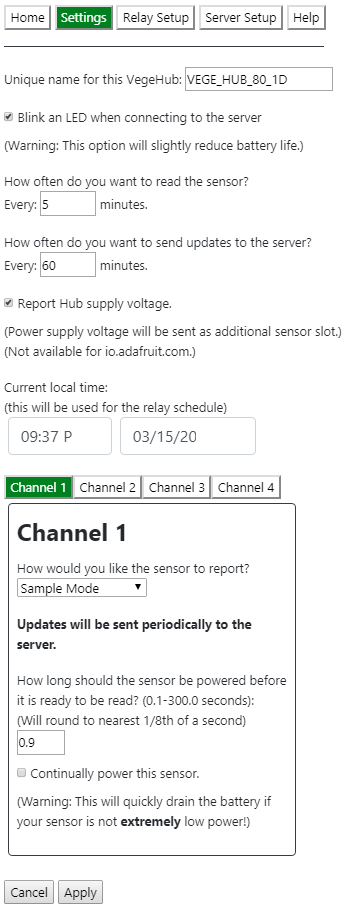
Configure the VegeHub Channels Through its Setup Pages
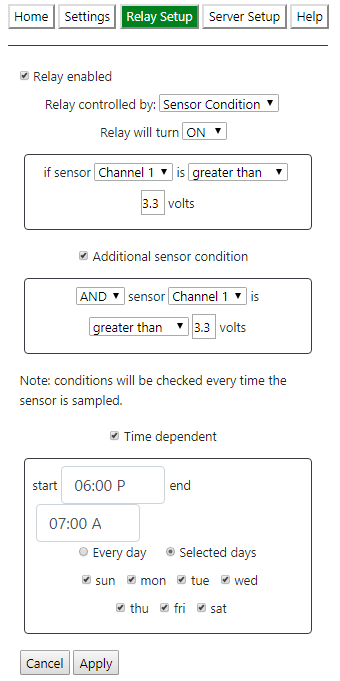
Setup the Relay to be Triggered from Local Sensors
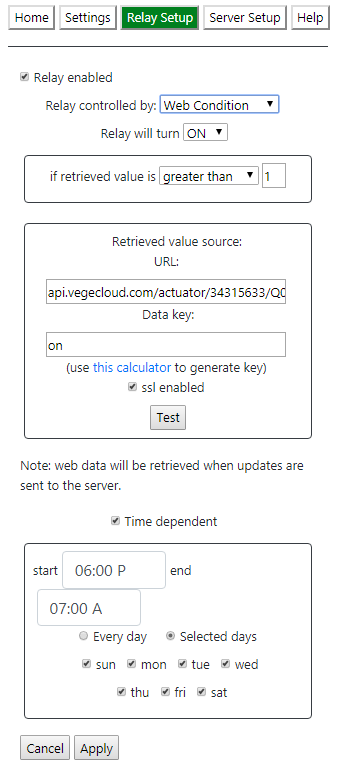
Setup the Relay to be Triggered from a URL
Pricing and Ordering Info
We ship to nearly EVERY COUNTRY on the planet, directly to you from our factory.
99% of orders ship same day.
| BUY NOW FROM OUR WEBSITE STORE | |||
| Part Number | Description | Price | Purchase |
|---|---|---|---|
| VG-HUB4S-1R | VegeHub WiFi Control hub with 4 sensor inputs and a 15A relay switch. | Buy Now | |
| VG-HUB4S-1L | VegeHub WiFi Control hub with 4 sensor inputs and a latching pulse output. (Only for use with AgriSwitch or latching sprinkler valves.) | Buy Now | |
| VG-HUB1S-1R | VegeHub WiFi Control hub with 1 sensor input and a 15A relay switch. | Buy Now | |
| VG-HUB1S-1L | VegeHub WiFi Control hub with 1 sensor input and a latching pulse output. (Only for use with AgriSwitch or latching sprinkler valves.) | Buy Now | |
| ACCESSORIES | |||
| BH-AA-9V | 9V battery holder with snap clip. Holds 6 AA batteries. Recommended for all VegeHubs. | Buy Now | |
| BATTERY-BOX-6AA | Rain Resistant Battery Box for 9V battery holders. (Does not include the battery holder. Also purchase the BH-AA-9V from the link directly above.) | Buy Now | |
| BRACKETS (Optional) | |||
| BRACK-PVC-100-0_75 | 3/4" PVC mast mounting bracket for HUB4. Hole spacing of 100mm. | Buy Now | |
| BRACK-PVC-100-0_5 | 1/2" PVC mast mounting bracket for VG-HUB4. Hole spacing of 100mm. | Buy Now | |
| BRACK-PVC-50-0_75 | 3/4" PVC mast mounting bracket for HUB1. Hole spacing of 50mm. | Buy Now | |
| BRACK-PVC-50-0_5 | 1/2" PVC mast mounting bracket for HUB1. Hole spacing of 50mm. | Buy Now | |
VegeHub WiFi Control Hub - Specifications
| VegeHub | |
|---|---|
| Relay Rating | 16A 250V |
| Power consumption |
Sleep mode: 20uA. Add 12uA for each edge triggered channel. Server update mode: 38mA for about 2.5 seconds. Sensor read mode: 11mA + the current consumption of the sensor. Relay Change State: 200mA for 100 milliseconds. |
| WiFi Compatible | IEEE 802.11b, IEEE 802.11g, IEEE 802.11n |
| Sample Bits | 12 |
| Internal Storage | 64 Samples/Channel |
| Supply voltage | 5.0 to 12V supply |
| Dimensions | See drawing below. |
| Number of sensor inputs | 4 sensor inputs |
| Maximum sensor input voltage. | 0 to 3.3V |
| Voltage to Sensors | Same as voltage input to unit. |
| Operational Temperature | -40°C to 85°C |
| Enclosure | Wall mounting bracket. |
| Maximum Sample Rate | once per minute |
| Maximum update Rate | once per minute |
| Weatherproof | yes |
| Custom URL API | VegeCloud API format |
| Current Firmware Version | 3.10.8 (Older Version Notes) |
| Certifications | CE Declaration of Conformity |
VegeHub WiFi Control Hub - Dimensions
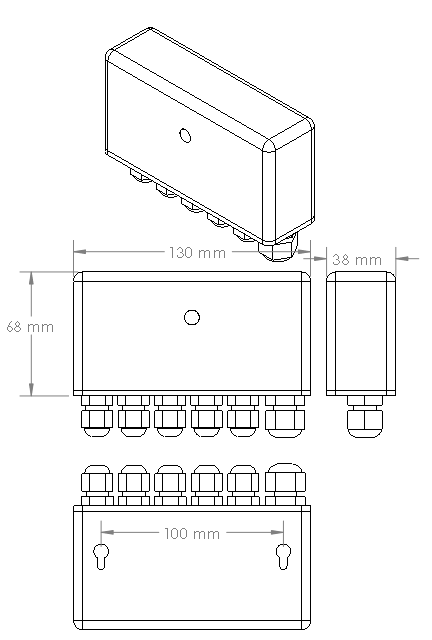
Quad Channel VegeHub WiFi Control Hub Dimensions
VegeHub WiFi Control Hub - Battery Considerations
If you intend on powering the VegeHub from a battery, battery selection is very important. Not all batteries types act the same in different environmental conditions. For example alkaline batteries do not do well in cold temperatures.
For temperature extremes Lithium Ion batteries are best, with a typical range of -40°C to 60°C. If you need off the shelf disposable batteries we recommend Energizer Ultimate Lithium batteries. Their 9V battery has a 700mAh capacity, and their AA have a 3500mAh capacity. If you use the AA batteries we recommend that you get a 9V or 12V AA battery holder to supply power to the VegeHub.
Rechargeable 3.7V Lithium Ion 18650 batteries are also a good choice, for environmental extremes, and for long life. Two batteries in series is sufficient to power the VegeHub.
Because batteries off-gas acid, especially in hot environments, never place batteries inside the VegeHub enclosure, as this will corrode and destroy the electronics, over time.
Safety Advisories
WARNING: The VegeHub has an internal high voltage relay. To prevent accidental electrocution, before opening the enclosure or configuring it, turn off any high power source to which the hub is connected.
WARNING: The high power relay may switch on or off at any time, unexpectedly, and in turn unexpectedly turn on or off any devices that are connected to the hub's relay. Before touching any equipment that is controlled by the VegeHub make sure that any power running to the equipment is turned off.
WARNING: Don't use the hub in situations where it's failure could cause damage to property, or harm to people or animals.
VegeHub WiFi Control Hub - Quick Start Guide
Connect the VegeHub to a remote server with the VegeHub Quick Start Guide.
VegeHub WiFi Control Hub - Tutorial Videos
Never Forget To Refill Chicken Water Tanks: Water Level Sensor with Alerts
Automate Grow Lights in Minutes with a VegeHub
VegeCloud Tutorial (The Free Data Aggregation Cloud Site)
Stop Over watering: Moisture Sensor Controlled Hose Sprinkler
VegeHub WiFi Control Hub - Advanced Options
See our VegeHub Trouble Shooting Guide for any difficulties setting up your hub.